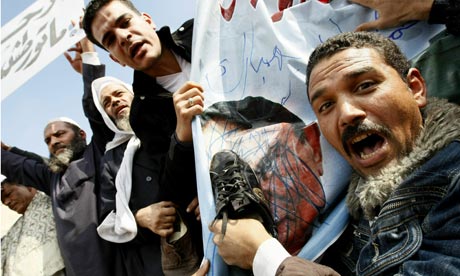西方自由主义者对于埃及和突尼斯起义的反应,屡屡表现出虚伪和犬儒主义。
在突尼斯和埃及的起义中,不能不注意到穆斯林原教旨主义的明显缺位。在最佳的世俗民主传统中,人们起义就是为了反抗专制政权、腐败与贫困,要求自由和改善民生。而按照西方自由主义者的犬儒智慧,在阿拉伯国家里,真正拥有民主意识的只是少部分自由精英,而绝大多数人群只能靠宗教原教旨主义或民族主义才可以动员起来,事实证明,这种观点是错误的。现在最大的问题,接下来将发生什么?谁会成为政治赢家?
突尼斯在提名组成新的临时政府时,把伊斯兰主义和更为激进的左派统统排除在外。自由派对此自鸣得意的反应是:很好;那两个基本上是一路货,都是极权主义的极端势力。事情真这么简单吗?难道长期根本的对立、不正是发生在伊斯兰分子与左派之间吗?这两者即便得以短暂地联合起来反对现政权,可这种联合一旦接近胜利就会破解,代之以玩命的争斗,这种争斗往往比他们对抗共同的敌人还要残忍。
此前的伊朗大选引发的斗争,不正是一个证明吗?成千上万的穆萨维支持者所主张的,是支撑了霍梅尼革命的大众梦想,即自由和社会正义。也许这是乌托邦,但它确实引致了政治和社会的创造力的激动人心的爆发、导致了有组织的实验和学生与普通百姓间激烈的政治辩论。这种真正意义上的开放,让人们释放出空前的变革社会的活力。人们感到一切似乎都有了可能,可是,随着伊斯兰原教旨主义接管了政权,这种开放的活力被渐渐地扼杀了。
即便是一场明确无误的原教旨主义运动,这种场合也要小心,不要漏过了社会成分。塔利班常常作为原教旨主义的伊斯兰集团、以实行恐怖统治的面目出现。然而,《纽约时报》的一则报道说,塔利班2009年春在接管了巴基斯坦的史瓦特河谷后,曾”利用一小撮富裕地主与当地无地的佃农之间的深刻矛盾,发起了一场阶级抗争”。如果说塔利班”利用”农民的困境是个创意,用《纽约时报》的话说,乃是对”封建性质仍然大量残存的巴基斯坦发出的危险警报”,那么,是什么妨碍了巴基斯坦的自由民主人士和美国也去类似地”利用”困境以解救无地的农民呢?难道说,巴基斯坦的封建势力是自由民主势力的天然盟友?
这不可避免地得出结论,这就是激进的伊斯兰势力的兴起,总是伴随着穆斯林国家中世俗左翼的缺位。当阿富汗被描绘成最大的伊斯兰原教旨主义国家的时侯,谁还记得40年前,这个国家曾有浓重的世俗传统,包括一个独立于苏联而建立了政权的强大共产党?这种世俗传统现在哪去了?
这一点正是解读最近连续发生在突尼斯和埃及的事件(还有也门……以及有望波及到沙特阿拉伯)的关键。如果局势最后朝着让旧政权存活的方向被稳定了下来,仅仅施加一些自由主义的整容手术,那么一场源自原教旨主义的战无不胜的反弹必然会产生。自由主义者如果想让自由主义的核心遗产能够存活下去,就必需获得来自激进左派的友好帮助。回到埃及的问题来,现在一个最可耻最危险的机会主义式的反应,就是CNN报道的托尼·布莱尔的话:变革是必要的,但必须是一个稳妥的变化。
今天,想要在埃及进行稳妥的变化,无异于和穆巴拉克势力妥协,办法就是稍稍扩大统治圈子的范围。这就是为什么现在谈论所谓和平过渡只是一种猥亵,因其实质不过是没有了穆巴拉克、但依然镇压反对派。从穆巴拉克派出军队弹压示威的那一刻开始,人们就面临明确的选择:是要为了保全整体而修改局部的整容,还是要真正的质变?
现在我们将要面对一个真理:我们无法像十年前的阿尔及利亚那样宣称【人文与社会注:指1999年阿尔及利亚选举,军队支持布特弗里卡上台】,所谓真正的自由选举,不过等同于把权力交给穆斯林原教旨主义者。自由派的另一个担心恰是,如果穆巴拉克下台,没有有组织的政治力量出来接管政权。当然不会有。穆巴拉克已经通过压制所有的反对力量解决了这个问题,他们都成了边缘化的点缀品。结果就如阿加莎·克里斯蒂著名小说的标题那样:”无人生还”(And Then There Were None)那种支持穆巴拉克的观点:要么选穆巴拉克要么选择动乱--其实是反对他的论据。
西方自由主义者的虚伪令人惊艳不已:他们过去公开支持民主,而现在呢,当人民以世俗自由和正义的名义、而不是宗教的名义来反抗暴君的时候,他们又个个陷入了深忧。你们忧虑什么?为什么不乐见自由得到新的机会?今天,毛泽东的老话比以往任何时候都要切题:”天下大乱,形势大好。”
穆巴拉克何去何从?答案十分明确:到海牙去。如果有一个领导人应该去坐坐,非他莫属。
110201 zizek
Why fear the Arab revolutionary spirit?
- The western liberal reaction to the uprisings in Egypt and Tunisia frequently shows hypocrisy and cynicism

- An Egyptian demonstrator uses his shoe to hit a picture of President Hosni Mubarak during a protest in Cairo. Photograph: Mohammed Abed/AFP/Getty Images
What cannot but strike the eye in the revolts in Tunisia and Egypt is the conspicuous absence of Muslim fundamentalism. In the best secular democratic tradition, people simply revolted against an oppressive regime, its corruption and poverty, and demanded freedom and economic hope. The cynical wisdom of western liberals, according to which, in Arab countries, genuine democratic sense is limited to narrow liberal elites while the vast majority can only be mobilised through religious fundamentalism or nationalism, has been proven wrong. The big question is what will happen next? Who will emerge as the political winner?
When a new provisional government was nominated in Tunis, it excluded Islamists and the more radical left. The reaction of smug liberals was: good, they are the basically same; two totalitarian extremes – but are things as simple as that? Is the true long-term antagonism not precisely between Islamists and the left? Even if they are momentarily united against the regime, once they approach victory, their unity splits, they engage in a deadly fight, often more cruel than against the shared enemy.
Did we not witness precisely such a fight after the last elections in Iran? What the hundreds of thousands of Mousavi supporters stood for was the popular dream that sustained the Khomeini revolution: freedom and justice. Even if this dream utopian, it did lead to a breathtaking explosion of political and social creativity, organisational experiments and debates among students and ordinary people. This genuine opening that unleashed unheard-of forces for social transformation, a moment in which everything seemed possible, was then gradually stifled through the takeover of political control by the Islamist establishment.
Even in the case of clearly fundamentalist movements, one should be careful not to miss the social component. The Taliban is regularly presented as a fundamentalist Islamist group enforcing its rule with terror. However, when, in the spring of 2009, they took over the Swat valley in Pakistan, The New York Times reported that they engineered "a class revolt that exploits profound fissures between a small group of wealthy landlords and their landless tenants". If, by "taking advantage" of the farmers' plight, the Taliban are creating, in the words of the New York Times "alarm about the risks to Pakistan, which remains largely feudal," what prevented liberal democrats in Pakistan and the US similarly "taking advantage" of this plight and trying to help the landless farmers? Is it that the feudal forces in Pakistan are the natural ally of liberal democracy?
The inevitable conclusion to be drawn is that the rise of radical Islamism was always the other side of the disappearance of the secular left in Muslim countries. When Afghanistan is portrayed as the utmost Islamic fundamentalist country, who still remembers that, 40 years ago, it was a country with a strong secular tradition, including a powerful communist party that took power there independently of the Soviet Union? Where did this secular tradition go?
And it is crucial to read the ongoing events in Tunisia and Egypt (and Yemen and … maybe, hopefully, even Saudi Arabia) against this background. If the situation is eventually stabilised so that the old regime survives but with some liberal cosmetic surgery, this will generate an insurmountable fundamentalist backlash. In order for the key liberal legacy to survive, liberals need the fraternal help of the radical left.
Back to Egypt, the most shameful and dangerously opportunistic reaction was that of Tony Blair as reported on CNN: change is necessary, but it should be a stable change. Stable change in Egypt today can mean only a compromise with the Mubarak forces by way of slightly enlarging the ruling circle. This is why to talk about peaceful transition now is an obscenity: by squashing the opposition, Mubarak himself made this impossible. After Mubarak sent the army against the protesters, the choice became clear: either a cosmetic change in which something changes so that everything stays the same, or a true break.
Here, then, is the moment of truth: one cannot claim, as in the case of Algeria a decade ago, that allowing truly free elections equals delivering power to Muslim fundamentalists. Another liberal worry is that there is no organised political power to take over if Mubarak goes. Of course there is not; Mubarak took care of that by reducing all opposition to marginal ornaments, so that the result is like the title of the famous Agatha Christie novel, And Then There Were None. The argument for Mubarak – it's either him or chaos – is an argument against him.
The hypocrisy of western liberals is breathtaking: they publicly supported democracy, and now, when the people revolt against the tyrants on behalf of secular freedom and justice, not on behalf of religion, they are all deeply concerned. Why concern, why not joy that freedom is given a chance? Today, more than ever, Mao Zedong's old motto is pertinent: "There is great chaos under heaven – the situation is excellent."
Where, then, should Mubarak go? Here, the answer is also clear: to the Hague. If there is a leader who deserves to sit there, it is him.









